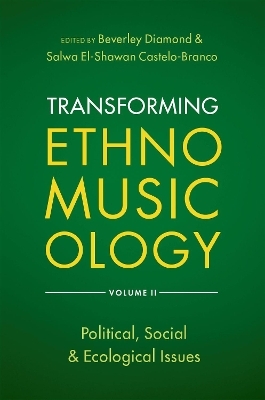
Transforming Ethnomusicology Volume II
Oxford University Press Inc (Verlag)
978-0-19-751755-0 (ISBN)
For decades, ethnomusicologists across the world have considered how to affect positive change for the communities they work with. Through illuminating case studies and reflections by a diverse array of scholars and practitioners, Transforming Ethnomusicology aims to both expand dialogues about social engagement within ethnomusicology and, at the same time, transform how we understand ethnomusicology as a discipline.
The second volume of Transforming Ethnomusicology takes as a point of departure the recognition that colonial and environmental damages are grounded in historical and institutional failures to respect the land and its peoples. Featuring Indigenous and other perspectives from Brazil, North America, Australia, Africa, and Europe this volume critically engages with how ethnomusicologists can support marginalized communities in sustaining their musical knowledge and threatened geographies.
Beverley Diamond is Professor Emerita at Memorial University of Newfoundland where she served as the first Canada Research Chair in Ethnomusicology and founded and directed the Research Centre for the Study of Music, Media, and Place (MMaP) from 2003-15. Diamond is known for her feminist music research and her work on Canadian cultural historiography and Indigenous music cultures in North America and Scandinavia. Salwa El-Shawan Castelo-Branco is Professor of Ethnomusicology at the Faculty of Social Sciences and Humanities of the Nova University of Lisbon, Portugal, where she founded and directs the Ethnomusicology Institute - Center for the Study of Music and Dance (INET-md). Her publications focus on cultural politics, musical nationalism, identity, music media, modernity, heritagization, and music and conflict in Portugal, Egypt, and Oman.
Ethnomusicological Praxis: An Introduction
Beverley Diamond and Salwa El-Shawan Castelo-Branco
Chapter 1: A Sound Economy
Jeff Todd Titon
Chapter 2: Music for Global Human Development
Michael Frishkopf
Chapter 3: Reengaging Sound Praxis in the Real World: Politico-Epistemological Dimensions of Dialogue and Participation in Knowledge Production
Samuel Araujo
Chapter 4: Silenced Registers of Ethnomusicological Academic Labor under Neoliberalism
Ana Hofman
Chapter 5: Sonic Mapping and Critical Citizenship: Reflections on LimerickSoundscapes
Aileen Dillane and Tony Langlois
Chapter 6: The Earth Is (Still) Our Mother: Traversing Indigenous Landscapes through Sacred Geographies of Song
Chad Hamill
Chapter 7: The Modernity of the Songlines
Rhoda Roberts
Chapter 8: Music Endangerment, Repatriation and Intercultural Collaboration in an Australian Discomfort Zone
Sally Treloyn and Rona Goonginda Charles
Chapter 9: Dancing Domba: Intersections of Ethnomusicology, Music Education, and Research with Children and Young People
Andrea Emberly and Mudzunga Junniah Davhula
Chapter 10: Ethical Friction: IRBs, Ethnolmusicological Ethics, and Music in an American Jail
Andy McGraw
Chapter 11: Ethnomusicology and the Meeting of Knowledges in Music: The Inclusion of Masters of Traditional Musics as Lecturers in Higher Education Institutions
José Jorge de Carvalho
| Erscheinungsdatum | 06.04.2021 |
|---|---|
| Zusatzinfo | 16 figures |
| Verlagsort | New York |
| Sprache | englisch |
| Maße | 239 x 163 mm |
| Gewicht | 576 g |
| Themenwelt | Kunst / Musik / Theater ► Musik ► Klassik / Oper / Musical |
| Sozialwissenschaften ► Ethnologie | |
| Sozialwissenschaften ► Soziologie | |
| ISBN-10 | 0-19-751755-2 / 0197517552 |
| ISBN-13 | 978-0-19-751755-0 / 9780197517550 |
| Zustand | Neuware |
| Haben Sie eine Frage zum Produkt? |
aus dem Bereich


